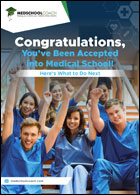
Congratulations! All your years of hard work have paid off. You’ve finally gotten into medical school.
What now?
Read on. We will provide information on how to appropriately commit to a medical school and how to prepare for it. Furthermore, you will get insightful advice from former MedSchoolCoach clients who are current medical students as well as our advisors.
Get ready, and good luck as you prepare for the next steps in your journey to become a physician!
Download the guidebook:
You’ve Been Accepted into Medical School – Here’s What to Do Next!
Obey the AAMC Traffic Rules
After you’re done celebrating – which you should definitely do – familiarize yourself with the AAMC’s Traffic Rules so you don’t jeopardize any of your acceptances. Here are some of the main things to remember:
Designate Your Enrollment Plans
Beginning February 19, applicants that have an acceptance offer from one or more schools can log on to the AMCAS Choose Your Medical School Tool via the AMCAS application to designate their enrollment plans.
Identify Your ‘Plan to Enroll’
Are you ready to commit to your decision to enroll? Log on to the AMCAS Choose Your Medical School Tool and choose ‘Plan to Enroll.’ Applicants can only select this option for one school, so it is important they are ready to commit.
Once you select ‘Plan to Enroll,’ schools are able to see how many applicants have committed, giving them the ability to extend additional offers to other candidates.
Students may commit to their plan from February 19 to April 29.
Proceed to ‘Commit to Enroll’
Beginning April 30, applicants can now select ‘Commit to Enroll.’ Selecting this option indicates that an applicant is firmly committed to attend this school and has withdrawn other offers.
Applicants must still communicate directly with the school(s) where they have received an acceptance to confirm the acceptance based on the school’s specific policies. The AMCAS Choose Your Medical School Tool does not make this notification for you.
Applicants must also withdraw directly from schools they do not wish to attend. The AMCAS Choose Your Medical School Tool does not make these notifications.
After April 30, schools limit time to respond to acceptance offers to 5 days under normal timing, and just 2 days if the matriculation is within 30 days.
Once you select ‘Commit to Enroll,’ schools open up admission slots to other applicants and fill their class accordingly.
From Texas? Learn about the TMDSAS Match
If you are a Texas resident, you need to familiarize yourself with the TMDSAS match.
TMDSAS administers a matching process for all Texas resident medical applicants. Essentially, the TMDSAS Match is conducted to confirm the pre-match offers that some applicants may be holding and fill the remaining open slots for the medical schools. Applicants that have not received pre-match offers can still match to a school where they have interviewed. Applicants holding a pre-match offer can match to a school that they ranked higher than their pre-match offer school even if they did not receive a pre-match from the higher ranked school. Any applicants holding multiple pre-match offers will come out of the match with one acceptance.
Eligible applicants rank all schools at which they interviewed according to their preference for attendance. Deadline for applicant match ranking is February 19. The medical schools then submit to TMDSAS their ranked lists of the applicants they have interviewed. TMDSAS then matches applicants with their highest preference school in which they were also in the match range for the school’s list. The results of the Match are announced each year on March 5.
Applicants are still eligible to receive alternate offers from schools they ranked higher on their list than the match offer they received, if any.
If you are not a Texas resident but applied to medical schools in Texas, you will not be included in the match process.
Take a Second Look
If you received more than 1 medical school acceptance and are trying to determine your top choice, take advantage of each medical school’s “second look.” This is only an option occasionally, and in 2021, it could likely be virtual. Still, it is highly recommended.
This is a great opportunity to get a more in-depth understanding of the school by interacting with and asking questions to the students, faculty and staff.
This is a great time to ask more detailed questions about:
- The curriculum
- Research opportunities
- Personal interests
- Student culture
- Support for residency matching (along with the match list)
- Mental health support
- Financial aid, grants, and merit scholarships
- Housing and daily living activities (e.g., do you need a car)
A medical school coach can help you answer some of these tough questions.
Enjoy Your Time After Acceptance and Before Medical School
Once you’ve figured out where you will be spending the next four years of your life, you may have some free time before the start of medical school.
If so, what should you do? Should you begin to prepare for medical school to get a leg up on your studies? Perhaps. But keep in mind that once medical school begins, you will be extremely busy with little free time. This will only intensify once you match into a residency program.
Therefore, you may wish to take advantage of this unique free time to do non-medically related activities.
Read a book. Take a vacation. Volunteer. Learn a new language. Delve into a hobby. Spend time with your friends and family. Do whatever floats your boat!
Get Your Logistics in Order
While you’re enjoying your time before the start of medical school, take care of your critical logistics to make sure that your transition to medical school goes as smoothly as possible.
Access Financial Aid
Given the high cost of medical school and the fact that many medical students carry college debt, figuring out how you will pay for medical school is the first thing you need to do once you have committed to one.
While you should receive detailed information from your medical school regarding this, you can also find information on the medical school’s website.
In addition to medical school-specific information, AAMC also has helpful financial aid information.
Get Housing
As soon as you have committed to a medical school, you should figure out your housing situation. Depending on the medical school, options include university-owned housing, renting and sometimes even purchasing a home. You should receive detailed information from your medical school, but also get advice from current medical students.
Find Transportation
You also need to figure out your transportation needs, which in part depends on where you live. Even if you can walk to your medical school for classes, quite often you need a car for clinical rotations, which are sometimes at hospitals and clinics that are far away from the medical school. You should receive detailed information from your medical school, but also get advice from current medical students.
Start Medical School on the Right Foot
Familiarize yourself with your medical school’s curriculum first. Compared to college, the volume of work is much higher, and the pace is much faster. Even though it differs among medical schools, in general, the first year is focused on the basic sciences (e.g., anatomy, physiology, histology and biochemistry), which are taken as classes and labs. Some medical schools have their students take 4 to 5 classes on various subjects at once. Others focus on 1 subject at a time for a few weeks. Some utilize an interdisciplinary approach.
No matter the approach that is used, the following advice should help ease your transition to medical school:
Cultivate a Support System of Other Students
Even though you will end up knowing everyone in your class, make an effort to get to know some of them well. This group will be your support system throughout medical school. Even if you’re an introvert and like to keep to yourself, this is still important. It’s much harder (and much less fun) to go through medical school without a group of fellow students you can rely on.
Don’t Procrastinate Learning
While you may have gotten away with procrastinating in college, it won’t work in medical school. The volume and pace of work is just too much higher and faster compared to life as an undergrad. Cramming does not work in medical school because it’s more than memorizing facts and figures. It’s about understanding and applying concepts – and this takes time.
Ask for Help When You Need a Hand
You likely excelled in college without ever needing extra help – after all, you were bright enough to get accepted into medical school. Perhaps you needed a hand from tutors or other resources. Either way, you may still feel overwhelmed academically once you start medical school.
Feeling overwhelmed is completely normal. There’s no shame in asking for help! Don’t let pride (i.e., “I shouldn’t need help,” “I’m too embarrassed to ask for help”) get in the way and prevent you from asking for help early.
Take advantage of office hours, review sessions and any other relevant resources. Familiarize yourself with the resources your medical school offers in terms of academics, mental health and beyond.
Get Involved, But Don’t Overcommit to Extracurriculars
Given the excitement and novelty when you first begin medical school, it’s tempting to sign up for every extracurricular under the sun. Before committing to any extracurriculars, however, first get a feel for what med school is like in terms of your academics. Once you do, then join a few extracurriculars that you’re passionate about. Then optimize each experience by demonstrating long-term commitment, leadership, evolution and growth and results. These are the things residency programs care about when evaluating your experiences when you apply during your fourth year.
Take Care of Yourself Before You Can Care for Others
It’s easy to forget the fundamentals of caring for yourself once medical school starts because you’re so busy. Proactively make an effort to do this. Otherwise, your physical and mental health will suffer, which will negatively impact your medical school experience. Don’t forget to stay in touch with friends and family, take breaks, eat regularly, sleep regularly, go to the bathroom regularly (believe it or not, people forget to do this when they get too busy) and attend to your other activities of daily living.
Advice from MedSchoolCoach Students
If you had multiple medical school acceptances, what did you do to figure out which medical school was best suited for you?
The main factors I considered were the location, class size, financial aid, and personal interactions from my interview day (e.g., what the med school culture was like). Since almost every medical school will have opportunities in research, early clinical experiences, and teach the same material, I focused on the learning style and environment which was more likely to be variable between schools (e.g., flipped classroom, small group learning). It helps to compile a list of questions and talk to current students in the programs you’re admitted to get a better sense of what it is like to be a student there.
If you participated in a second look visit (even a virtual one), what advice do you have for optimizing this opportunity?
Try to connect with other admitted students. Second look is a great time to find potential roommates. You should ask what the housing situation is like at each given medical school. For example, do people live on campus or off campus? Do most students have a car or bicycle? Asking these questions ahead of time will save you a lot of hassle later, and help you better envision what your life would be like living there.
Given the high cost of medical school, what advice do you have in terms of financial aid, grants and scholarships?
It can be difficult to find external grants and scholarships to help pay for medical school. Be sure to ask what opportunities there are for medical students to earn money during medical school, such as TA-ships or paid research opportunities. Plus, get your FAFSA in early!
How would you recommend soon-to-be medical school students use their free time (e.g., summertime) prior to the start of medical school?
- Relax, connect with friends and family, read a lot, and try a new hobby (mine was skateboarding)! If you have the chance to travel, the summer before medical school is a great time. It’s also not a bad idea to work and save some money, since there are a lot of expenses at the beginning of medical school with moving.
- If you’re worried about the sudden class load, you could do some review on the topics covered in the first few weeks of your curriculum. I would definitely recommend consulting acquaintances currently in medical school or any upperclassmen you can get in contact with at your school to ask them for advice on how to adapt.
- Scribing work really helped me get used to documentation and such. ProScribe is a great option for that.
- Arrive at med school a couple weeks early to get to know the surrounding location. Try to find a roommate!
What’s the best advice you have for soon-to-be medical school students? - The hardest part is actually getting into medical school. So congratulations! Medical school is a fun place to explore your interests and get excited about all the different paths within medicine. Think about your values and what kind of physician you want to become, and let that passion lead you down the right path for you.
- Everything seems hard until you get past it. You are much more capable than you think you are, and even the worst times will pass and get better. You may struggle a bit during your first few months, and there will be lots of obstacles waiting for you, but with each obstacle you overcome, you’ll become more experienced and confident in yourself.
- Get used to online/distance education. Students do a ton of classwork online now, up to and including patient encounters.
- For soon to be med students, there is no need to try to “get ahead” of the learning curriculum by studying in advance. Rather, it is more important to plan out what you want to do regarding extracurriculars in your limited time (e.g., clubs, research, service learning, shadowing given circumstances). Don’t worry about clinical stuff until third year.
Tips from MedSchoolCoach Advisors
“One piece of advice I give entering medical students is to buy First Aid before they begin school. Then, use their class notes/PowerPoints to study for exams, but use First aid as their final review before each exam. That way, when it comes to studying for the USMLE, they have already gone through the review book, plus have had the advantage of a summary-type book to review prior to each exam they are taking in medical school.” – Harvey
“Becoming and then continuing as a physician is a marathon, not a sprint. Find a way to make it sustainable for you as an individual that works best for your particular circumstances and personality. Have a group of peers that are supportive with whom you can collaborate with helps, as does making sure you remember to take care of yourself. When you enter medical school, you don’t stop being a person with hobbies and interests. You also don’t stop needing to eat right, sleep enough, and exercise to stay healthy. This allows you to be a better provider.” -Alissa
“Make sure you enjoy the process. There is so much focus on performance and grades that it’s easy to forget to enjoy the ride. Take time to get to know your classmates, make friends, establish a mentor or mentors, exercise, and enjoy wherever you are for the next four years!” -David
“Talk with successful members of the senior class and learn what they did, especially if you are aiming for a competitive residency or field. TAs are especially helpful if they are senior medical students. Also, get to know faculty in non-medical settings through events hosted by the school. These mentors can go a long way to pick up a phone and help out students they believe in and like.” – Steve
“Medbullets.com is a useful, comprehensive, hand reference with a free question bank.” -Matthew
“Select a self-care activity early on and stick with it. It’s just as important to commit to caring for yourself as it is to commit to achieving academic excellence.” – Jasmin
“Medicine is a team sport, not a competition. A lot of energy is placed on getting into school and being better than another applicant. But once in medical school, the goal is to be the best physician you can become, not to be compared to others in your class. Reframe your energies on maximizing personal growth and development, seeking mentorship and guidance from those near peers as well as more experienced mentors.” – Kiran
“Do the things you love, and lots of them. Your passion will shine through, especially as your energy becomes obvious and infectious when you talk about your interests.” – Pallavi
“Find peers and others with shared interests. That can help you develop support and camaraderie, especially at the start of school when you are new and may have fewer supports. Some of the friendships made in medical school may last a lifetime.” – Henry
“When I started medical school, I had moved to a new city away from family and was living alone in a small studio. All I could think about was trying my best to achieve academic success. The first year of medical school was tough for me because I was so fixated on studying and trying to memorize everything. It wasn’t until the second year of med school that I relaxed and met a great group of friends. They individuals are now my lifelong friends and enriched the entire medical school experience.” – Katelyn
“Try to enjoy the experience and absorb as much as you can. You can’t memorize everything, but you definitely have to try and have a regimented plan for studying.” – Mohammad
Get MedSchoolCoach Tutoring and Advising
Boost Your Exam Scores
During your journey throughout medical school, remember that MedSchoolCoach is available for personalized tutoring for the USMLE and COMLEX.
● USMLE Step 1 Tutoring – Discover how one-on-one tutoring can help you maximize your scores on the USMLE Step 1.
● USMLE Step 2 Tutoring – Score higher on your USMLE Step 2 CK with our expert tutors.
● USMLE Step 3 Tutoring – Conquer your final hurdle by mastering your clinical knowledge.
● COMLEX Level 1 and 2 Tutoring – See how one-on-one tutoring can help you achieve amazing scores on your COMLEX level 1 and level 2.
Match Into Residency
MedSchoolCoach can provide guidance when you apply to residency programs, whether it’s from start to finish or just interview preparation
● Residency Advising – Discover how our physician advisors can help you transform your match prospects.
With MedSchoolCoach advisors, student’s get:
- No Limits – We don’t believe in limiting your communication with your advisor to a few edits. We are here for you when you need us.
- Great Results – Our physician advisors will have served on residency admissions committees and know how to help you succeed.
- Expert Advisors – Access amazing physician advisors with invaluable personal insight, but also tools that have been created through helping thousands of applicants.
- Unique Approach – The strategy part of your application takes you through everything you need to become a competitive applicant in the match.
- Personal Attention – Your advisor will get to know you inside and out. This helps in putting together the most cohesive application possible – one that accentuates your strengths and leaves you the best shot at an admission.
Best of luck as you begin medical school. You are on your way to becoming a physician.
| Congratulations on your acceptance to medical school! MedSchoolCoach will be here and available to help you through every step of your medical journey. In addition to MCAT prep and Direct Medical (BS/MD & BA/MD) Application Consulting, we offer residency advising, strategic planning, help with the boards, and more. |







